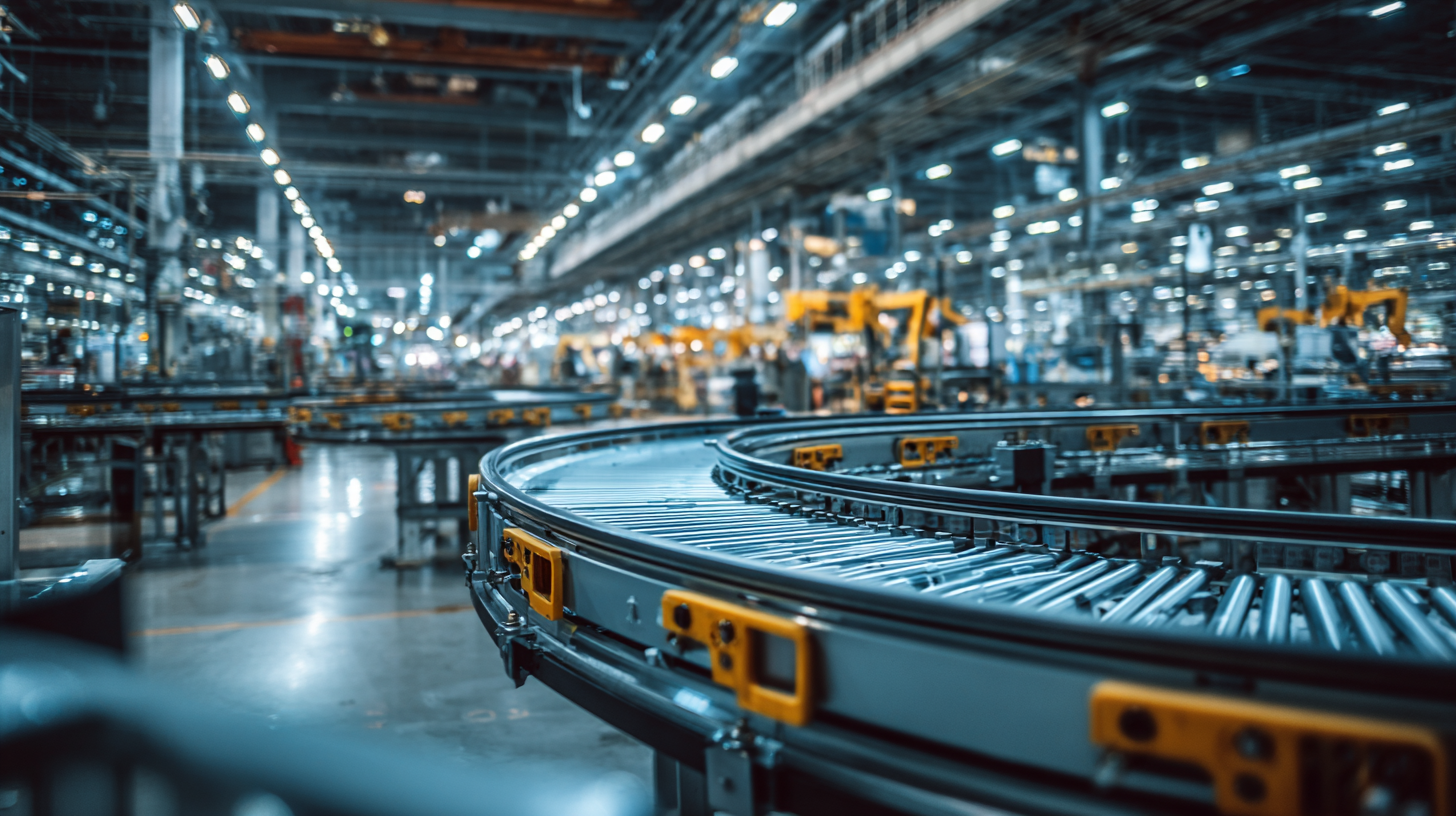
Exploring Best Suppliers in Industrial Automation Solutions and Their Global Impact
The global industrial automation market is expected to reach a staggering $300 billion by 2026, driven by the increasing demand for efficient production processes and technological advancements. Key to this growth are suppliers that not only provide high-quality products but also contribute to innovations that enhance productivity and reduce operational costs. In recent years, Chinese manufacturers have emerged as pivotal players in the global supply chain, delivering superior automation solutions that meet international standards. With advancements in smart manufacturing, the role of these suppliers has become even more critical, impacting industries worldwide by enabling seamless integration of advanced technologies. This blog will explore the best suppliers in industrial automation solutions, focusing on their contributions and the global implications of their excellence in manufacturing.

Overview of Industrial Automation Solutions and Their Role in Modern Industries
 Industrial automation solutions play a pivotal role in modern industries, enhancing efficiency, productivity, and safety. These advanced technologies streamline operations, reduce human error, and often lead to significant cost savings. From robotics that perform intricate tasks to software that monitors and optimizes processes, the landscape of industrial automation is continually evolving. Companies in this sector are at the forefront of innovation, integrating smart technologies that allow for real-time data analysis and improved decision-making.
Industrial automation solutions play a pivotal role in modern industries, enhancing efficiency, productivity, and safety. These advanced technologies streamline operations, reduce human error, and often lead to significant cost savings. From robotics that perform intricate tasks to software that monitors and optimizes processes, the landscape of industrial automation is continually evolving. Companies in this sector are at the forefront of innovation, integrating smart technologies that allow for real-time data analysis and improved decision-making.
Tips for selecting the right automation solutions include assessing the specific needs of your operation and understanding the scalability of the offered technology. It’s essential to choose suppliers known for their reliable support and ongoing service. Additionally, staying updated on the latest advancements in automation can give businesses a competitive edge and ensure they are utilizing the most effective tools available.
As industries strive for sustainability and resilience, the global impact of these automation solutions cannot be overstated. Collaborations among key players in the industrial automation space can lead to enhanced product offerings, further driving the transformation of manufacturing and production processes. Engaging with reputable suppliers not only supports individual business goals but also contributes positively to the broader industrial ecosystem.
Key Technological Parameters of Leading Automation Products and Their Functions
In the realm of industrial automation, understanding the key technological parameters of leading automation products is crucial for achieving operational excellence. According to a recent report by MarketsandMarkets, the global industrial automation market is projected to reach $296.70 billion by 2026, growing at a CAGR of 9.2%. This growth is driven by advancements in technology such as the Internet of Things (IoT), artificial intelligence (AI), and machine learning (ML), which are significantly enhancing functionality and efficiency in manufacturing processes. Products that prioritize safety, connectivity, and adaptability are reshaping the industry, making these parameters essential for future investments.

To navigate this complex landscape, companies should consider investing in automation solutions that focus on interoperability, enabling seamless communication between various systems. In fact, a study from ARC Advisory Group highlights that organizations embracing standard communication protocols can achieve up to 30% greater efficiency in their production lines. Additionally, robustness in design and ease of maintenance are vital; products that minimize downtime tend to offer substantial long-term savings.
Tips: When evaluating automation suppliers, emphasize product flexibility, as modular systems can easily adapt to evolving business needs. Furthermore, prioritize suppliers with a proven track record in global implementations, as they are more likely to understand the intricacies involved in scaling operations across diverse environments.
How to Choose the Right Supplier for Your Industrial Automation Needs
When selecting the right supplier for your industrial automation needs, it's essential to consider the dynamic market landscape. According to recent forecasts, the global machine vision market is projected to grow from $11.61 billion in 2024 to $22.59 billion by 2032, reflecting a robust compound annual growth rate (CAGR) of 8.7%. This growth signals a rising demand for advanced automation technologies, making it critical for businesses to partner with suppliers that can deliver innovative and scalable solutions.
Additionally, the industrial robotics sector is on a significant upward trajectory, with expectations to reach $60.14 billion by 2034, starting from $17.78 billion in 2024, and a CAGR of 13.3%. The increasing need for automation across various industries, driven by labor shortages and rising labor costs, underscores the importance of selecting a supplier with a solid track record in delivering reliable robotic solutions. Engaging with suppliers that understand these market trends can provide a competitive edge in optimizing industrial processes and enhancing operational efficiency.
Exploring Best Suppliers in Industrial Automation Solutions and Their Global Impact
| Supplier Category | Technology Offered | Global Reach | Key Industries Served | Annual Revenue (Estimated) |
|---|---|---|---|---|
| Robotics | Industrial Robots, Collaborative Robots | Worldwide | Manufacturing, Electronics | $5 billion |
| Control Systems | PLC, SCADA, DCS | North America, Europe, Asia | Oil & Gas, Water Treatment | $3 billion |
| Sensors and Actuators | Temperature, Pressure Sensors | Global | Automotive, Aerospace | $2 billion |
| Software Solutions | ERP, MES, Simulation | Worldwide | Manufacturing, Logistics | $4 billion |
| Connectivity Solutions | IoT Platforms, Networking | Global | Smart Manufacturing, Agriculture | $1.5 billion |
Analyzing the Global Impact of Automation Suppliers on Efficiency and Productivity
The global automotive robotics market is projected to reach a staggering $9.92 billion in 2024, with expectations of growth to $11.21 billion in 2025 and an impressive $26.76 billion by 2032. This rapid expansion underscores the vital role that automation suppliers play in enhancing efficiency and productivity across industries. As these automation solutions become more integrated into manufacturing processes, the ability to streamline operations and reduce costs has never been more significant. Automation not only facilitates faster production times but also contributes to consistent quality control, ultimately leading to increased output and profitability.
Moreover, the impact of generative artificial intelligence (AI) on the global economy cannot be overstated. This revolutionary technology arrives at a crucial moment as economies face workforce challenges driven by an aging population and declining productivity rates. Generative AI enhances procurement management and operational efficiency, making it a key driver in optimizing supply chains. As businesses adapt to this technological shift, the trend toward automation across various sectors—from automotive to healthcare—demonstrates a transformative approach to enhancing productivity, ensuring that industries are well-equipped to navigate future challenges.
Future Trends in Industrial Automation: What Suppliers Are Innovating Today
As the industrial landscape evolves rapidly, innovative suppliers are at the forefront of automating operations to meet the challenges of a digital and green transition. According to recent findings from industry reports, the integration of 5G, artificial intelligence, and big data is not just a trend but a necessity for companies aiming to enhance their production efficiency and sustainability. For instance, data indicates that sensors play a crucial role in this transformation, with advanced facilities producing up to 9.5 sensors per second—highlighting the urgency and importance of real-time monitoring and control in intelligent manufacturing.
Moreover, as more companies adopt digital solutions, a strategic focus on sustainability is reshaping supplier innovation. Reports suggest that the demand for renewable energy and energy-efficient systems is accelerating, compelling suppliers to explore greener pathways for industrial automation. The latest initiatives from leading suppliers emphasize the need for digitalization paired with environmental responsibility, showcasing a growing commitment to not only automate but also reduce the carbon footprint across industries. Thus, the synergy between technological advancement and sustainable practices will define the future of industrial automation, positioning these suppliers as pivotal players in global market shifts.
